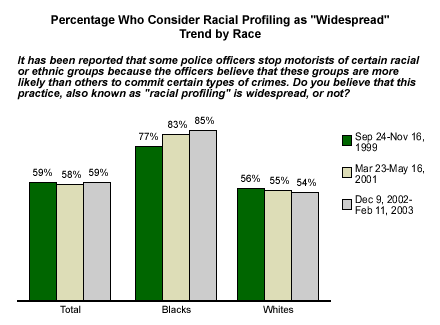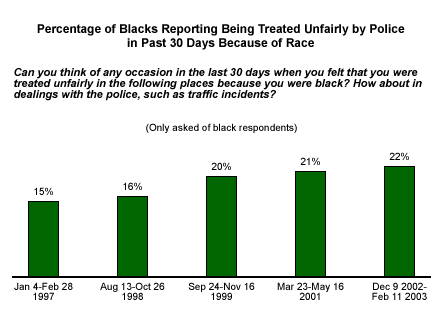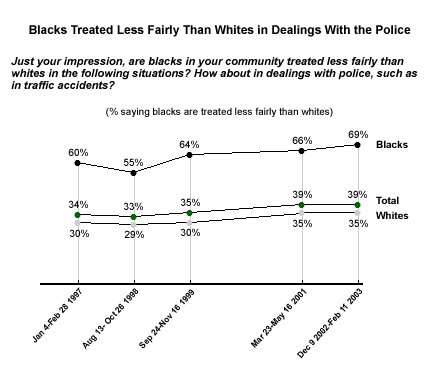New Jersey recently became the first state to make race-based arrests and searches crimes. The signing of this law was welcomed by civil rights activists who have long argued that the practice of "racial profiling" has led to unfair harassment, searches, and targeting of specific racial and minority groups by police. Gallup's latest social audit of race relations in the United States*, conducted between Dec. 9, 2002, and Feb. 11, 2003, reveals that a majority of Americans (59%) believe that racial profiling is widespread.
Black Americans are more likely than whites to perceive racial profiling as widespread in this country (85% vs. 54%). The proportion of black adults who feel the practice is widespread has grown from 77% in 1999 to 85% today. Yet opinion among whites has changed very little in the same time period (from 56% in 1999 to 54% today).

Men and women respond to this question similarly, but the data do indicate significant differences by age. Younger adults are more likely than older adults to believe racial profiling is widespread. This pattern is particularly strong among whites; a clear majority of whites under age 35 (66%) believe this practice is widespread, compared with 43% of whites aged 50 and older. Among black adults, 88% of those under age 35 believe racial profiling is widespread, compared to 77% of those aged 50 and older.
Belief in the prevalence of racial profiling is particularly widespread among blacks at higher levels of income and educational attainment. Among blacks with annual household incomes below $25,000, 79% believe it is widespread, but among those whose income is $45,000 or more, a strikingly high proportion (93%) holds this perception. These educational and income-related patterns do not appear (at least not to a statistically significant degree) among whites.
���۴�ýasked black adults specifically about whether they have personally received unfair treatment at the hands of the police. One in five blacks (22%) say that they have been unfairly treated "in dealings with police, such as traffic incidents" within the last 30 days because they are black. Such reports of unfair treatment by police have inched upward since this question was first asked in 1997 (from 15% to 22%).

All adults in the survey were asked whether blacks in their own communities are treated less fairly than whites in dealings with the police, such as in traffic incidents. Nearly 7 in 10 blacks (69%) feel that blacks are treated less fairly than whites in their own communities. In sharp contrast, only about one in three whites (35%) believe that the police in their communities treat blacks less fairly than whites. This gap between the perceptions of whites and blacks has been observed since the question was first asked in 1997.

���۴�ýalso asked Americans if they feel they are treated fairly by the state police and -- in a separate question -- local police in their area. Overall, a large majority of adults say that they are treated fairly by both local police in their area (88%) and by state troopers in their state (87%). However, large racial gaps are again evident in responses to both of these questions. Among whites, 92% feel they are treated fairly by local police, compared to only 60% of blacks. And while 91% of whites say they are treated fairly by state police, only a bare majority of blacks (54%) answer this way. The racial gap in perceptions of treatment by state police has actually increased considerably since the question was first asked (from 20 points in 1999 to 37 points in 2002-2003).
*���۴�ýconducted 1,044 telephone interviews from Dec. 9, 2002, through Feb. 11, 2003, with a randomly selected sample of adults in the continental United States. We interviewed roughly equal numbers of black and white respondents, permitting more reliable estimates of black opinion than would be possible in a standard national sample of a similar size. For our total sample of 1,044, one can say with 95% confidence that the margin of sampling error for percentages is not greater than ±5%. The parallel margins of sampling error are ±6% for the sample of 505 white respondents, and ±6% for the sample of 501 black respondents.
